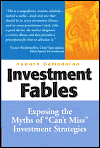Friday, February 03, 2006
Reading The Signs: What does a good mutual fund look like?
This post came about because of my doubts about the performance of index funds in India. Index funds in the US routinely outperform the majority of actively-managed funds. The theory is that long-term returns of most funds will be the average market return minus incurred costs of investment. So, passive index funds outperform active funds over the long-term by the sizeable difference in expenses. With respect to India, questions that I cannot answer for now are:
- Do the narrow sensex and nifty represent the market? If they don't, that's one assumption down.
- What are the long-term returns of mutual funds here? The lack of history of mutual funds is a problem here.
- What are the long-term returns of the indices with dividends reinvested (the so-called total return) and how do they compare with active funds? all sorts of information availability issues.
- How is one to know how to rate a mutual fund?
- How can we pick a mutual fund that has the highest chance of good (and consistent) returns?
- What if the fund manager quits, bets heavily on sectors or follows the market hype?
Here's my list.
#1 Small Size
This is not a small-cap versus big-cap argument. A small mutual fund invested in large-caps is just as safe (or risky) as a large mutual fund of the same class. The argument here is that a fund manager with smaller assets under management (AUM) will be able to better manage his or her portfolio. Further, a fund manager with a small AUM needs smaller winners than a fund manager with a larger AUM. The bigger you get, the harder it is to beat the average (I have seen the average and it is us). As Warren Buffett is said to have remarked, 'I can double your money as long as it is less than a million dollars'. The nervousness of going against the crowd (Ex: if he/she's so good, how come they don't have a bigger fund?) can be ameliorated by examining the fund further.
#2 Low Expense Ratios
This is quite obvious. Expenses eat away at your returns. The lesser your fund spends, the more you get to keep.
#3 Low turnover
Turnover numbers indicate the rate at which the composition of a portfolio changes. A high turnover indicates that the fund manager is second-guessing himself or herself. If the manager has that little faith in their choices, why should you have any at all? The other explanation could be that the manager is a market timer and/or a follower of short-term trends.
#4 Consistent Methodology
If the fund manager shares your views on investment, that's a good beginning. Every fund says that they want to invest in stocks at fair values and shoot for long-term appreciation. No one is going to come out and say 'we're going to chase hot sectors all year
#5 Entry Loads
Entry loads are much the same as expense ratios. The lower, the better.
#6 Long-Term view
Can your fund say no? Some mutual funds chase short-term returns to increase their assets under management or preserve their existing assets since investor flee at the first hint of underperformance. This pressure on short-term returns puts existing investors at risk for the benefit of the manager or the fund. If the fund had a long-term view, it would drive short-termers away and leave the ones that share the manager's views (This is a good thing).
#7 Consistent Returns
Obviously, a consistent above-average return is good. The manager must be doing something right. Just as important as the returns is the means by which they were obtained. A fund with many good performers is much better than a fund with a few rockets and a lot of duds. The manager is showing consistently good judgement in the former case.
This is not a condition for a mutual fund to do well but it should be the ONLY way you must invest in mutual funds. This is the first sieve I'd use. No SIP, no way.
Choosing a good mutual fund is the beginning. Keeping tabs on the fund with respect to the above is what is going to really get to you. Enough to make me wish index funds work.
